University of Klagenfurt
The University of Klagenfurt (German: Universität Klagenfurt or Alpen-Adria-Universität Klagenfurt, AAU) is a federal Austrian research university and the largest research and higher education institution in the state of Carinthia. It has its campus in Klagenfurt.
Alpen-Adria-Universität Klagenfurt | |
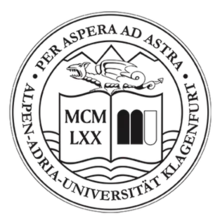 | |
| Motto | Per Aspera Ad Astra (Latin) |
|---|---|
Motto in English | Through hardships to the stars |
| Type | Public research university |
| Established | 1970 / 1975 / 1993 |
| Budget | € 62 million (2019, annual federal funding) |
| Vice-Chancellor | Oliver Vitouch |
Academic staff | 1,098 (2017) |
| Students | 11,664 (2017/18) |
| 749 (2017/18) | |
| Location | , |
| Campus | Suburban, 27 acres (11 ha) |
| Colors | Shades of Blue |
| Website | www.aau.at |
 | |
Originally founded in 1970 and relaunched in 1993, the university today holds faculties of humanities, management & economics, technical sciences, and interdisciplinary studies. It is listed in the ARWU, THE, and QS global rankings and holds rank 52 worldwide in THE's Young University Rankings 2020.[1]
The university has defined two research priority areas, Networked and Autonomous Systems and Social Ecology (until 2018, transferred to BOKU Vienna), with the latter spawning three ERC Grants. It has launched a new initiative, Humans in the Digital Age (HDA), in 2019, hosting an ERC Grant on cybersecurity.
It also holds a number of central facilities such as the Robert Musil Institute (co-organizer of the Bachmann Prize), the Karl Popper Kolleg (an Institute for Advanced Study), the University Cultural Centre (UNIKUM), the build! Gründerzentrum (a start-up facilitation center), the University Sports Centre (USI), and the Klagenfurt University Library.
Oliver Vitouch, a cognitive psychologist and former faculty member of the University of Vienna and the Max Planck Institute for Human Development in Berlin, is the university's Vice-Chancellor. Larissa Krainer chairs the Academic Senate; Werner Wutscher, Secretary General of the European Forum Alpbach, is chairman of the University Council.
The University of Klagenfurt is situated 30 km from the Slovenian and 60 km from the Italian border and supports bi- and multilingualism, especially in the context of the Slovenian minority in Carinthia. Together with the Free University of Bozen-Bolzano (Italy) and the University of Fribourg (Switzerland), it is among the three southernmost universities in the German-speaking world.
History
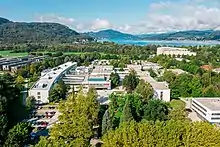
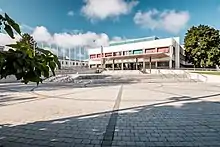
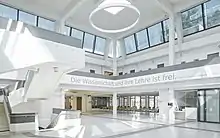
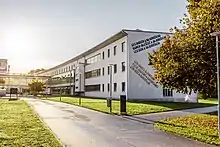
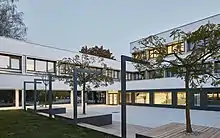
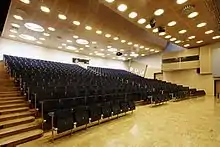
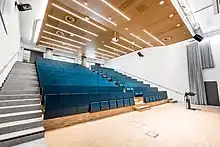
With the Protestant collegium sapientiae et pietatis founded in 1552, Klagenfurt hosted one of the oldest gymnasiums in Austria (today's Europagymnasium), directed by Hieronymus Megiser from 1593 to 1601, but had no ancient university tradition.
In 1970, the Austrian parliament passed a federal law allowing the establishment of an Educational Science College in Klagenfurt. The first doctoral degree was conferred in 1972. In 1975, new laws on higher education came into force, with the name of the college being changed into Universität für Bildungswissenschaften (University of Educational Sciences).
In 1993, a fundamental relaunch took place: The institution's name was changed to Universität Klagenfurt (University of Klagenfurt), and a Faculty of Humanities and a (new) Faculty of Economics, Business Administration, and Informatics were inaugurated. The Faculty of Interdisciplinary Studies was inaugurated in 2004.
The university adopted the official cognomen Alpen-Adria-Universität Klagenfurt in 2004 (with its legal name still being Universität Klagenfurt). It was extended with a fourth, technical sciences faculty in 2007 (with a focus on Informatics, Information Technology, and Networked & Autonomous Systems), engaging in research operations in collaboration with the Lakeside Science & Technology Park. In 2012, the number of students passed the 10,000 mark.
On occasion of the institution's 40th anniversary, a Boat Race was held on Lake Wörth in 2010. Klagenfurt's Eight won against the University of Vienna by a boat length on a sprinting distance from the rowing clubs to Maria Loretto castle.
In 2015, the university established commencement speeches at its graduation ceremonies. Among the speakers so far are Sabine Herlitschka, Josef Winkler, August-Wilhelm Scheer, and Johanna Rachinger. Presidents of Austria Heinz Fischer (formerly) and Alexander Van der Bellen (incumbent) are recurrent guests at doctoral graduations sub auspiciis Praesidentis.
In 2020, the university celebrated its institutional 50 year jubilee. This included a lecture series together with the Austrian Academy of Sciences, Utopia! Is the world out of joint? Contributions to the art of Enlightenment opened by Barbara Stollberg-Rilinger and the bestowal of an honorary doctorate to Rae Langton. Several further jubilee events were virtualized or postponed due to the COVID-19 pandemic. On Nov 22, 2020, the Austrian Broadcasting Corporation showed the TV documentary Humans in the Digital Age: University of Klagenfurt – 50th Anniversary.
Campus
With its suburban setting, the university campus is in walking distance of both the renaissance-dominated historic city centre of Klagenfurt (capital of the state of Carinthia) and the east bay of the Wörthersee, a renowned Austrian summer resort. Also hiking, climbing and skiing possibilities in the Austrian Alps are nearby. Together with the adjacent Lakeside Science & Technology Park,[2] a 60 acres start-up and spin-off park, the university campus forms the so-called Lakeside District.
From 2016 to 2018, the university's central and north wing (13,000 m2) were fully refurbished with a budget of €26 million. As a result, the university was shortlisted for the Prix Versailles – Campuses 2019 (under UNESCO patronage), together with buildings of the University of Chicago in Hongkong, Barnard College, Stanford University, SPA Vijayawada, and Skoltech, which won the competition.[3][4]
Faculties and departments
Faculty of Humanities
The Faculty of Humanities currently encompasses 11 departments and a faculty centre. Their common ambition, beyond doing discipline-specific research, is to foster multilingualism and intercultural education, with particular emphasis on the Alps-Adriatic region.
- Department of English and American Studies
- Department of Cultural Analysis
- Department of Educational Sciences and Research
- Department of German Studies
- Department of History
- Department of Media and Communications Science
- Department of Philosophy
- Department of Psychology
- Department of Romance Studies
- Department of Slavonic Studies
- Robert Musil Institute for Literary Studies
- Faculty Centre for Sign Language and Communication of the Hearing Impaired
Faculty of Management and Economics
The Faculty of Management and Economics has a focus on applied business management while fostering interdisciplinary links with law, sociology, economics and application-oriented geography. Within these disciplines, the faculty concentrates on areas of research and development, teaching and consulting in fields where cultural, business and social factors interact.[5]
- Department of Financial Management
- Department of Geography and Regional Studies
- Department of Innovation Management and Entrepreneurship
- Department of Public, Nonprofit, and Health Management
- Department of Organization, Human Resources, and Service Management
- Department of Operations, Energy, and Environmental Management
- Department of Law
- Department of Sociology
- Department of Business Management
- Department of Economics
Faculty of Technical Sciences
The Faculty of Technical Sciences is dedicated to research and training in the fields of informatics, information technology and technical mathematics. The faculty was founded in January 2007 and superseded the Faculty of Economics, Business Administration and Informatics as well as a newly established Department for information and communication technology. The faculty is headed by Dean Gerhard Friedrich (informatics) and Vice-Dean Clemens Heuberger (mathematics). It is organized into nine departments and offers four bachelor's degree programs, four master's degree programs, two teacher training degree programs and two doctoral programs.
- Department of Applied Informatics
- Department of Informatics Education
- Department of Informatics Systems
- Department of Information Technology
- Department of Mathematics
- Department of Mathematics Education
- Department of Networked and Embedded Systems
- Department of Smart Systems Technologies
- Department of Statistics
The special research area "self-organizing networked systems" closely collaborates with the research institute Lakeside Labs.[6]
Faculty of Interdisciplinary Studies
The Faculty of Interdisciplinary Studies develops, tests and evaluates innovative ideas in the academic fields of research, training and organization. The objective of the faculty is to tackle prevailing social problem areas by creating adequate research and learning processes.
- Department of Instructional and School Development
- Department of Science and Technology Studies
- Department of Science Communication and Higher Education Research
University centres
- Centre for Women's and Gender Studies
- Digital Age Research Centre (D!ARC)
- Karl Popper Kolleg
- M/O/T – School of Management, Organizational Development and Technology
- School of Education (SoE)
- UNIKUM (University Cultural Centre)
Partnerships
As of 2020, the University of Klagenfurt has strategic partnerships with the Austrian Academy of Sciences, the Ca' Foscari University of Venice, the Fraunhofer Austria Society and with Silicon Austria Labs (SAL) and offers joint study programs with the University of Vienna, the University of Graz and the University of Udine.[7][8][9][10][11]
Student mobility partnerships via Erasmus+ and other exchange programs exist with over 250 universities in more than 50 countries worldwide.[12]
Rankings
| University rankings | |
|---|---|
| Global – Overall | |
| ARWU World[13] | 801–900 (2020) |
| QS World[14] | 511–520 (2021) |
| THE World[15] | 301–350 (2021) |
The THE World University Rankings 2021 list the University of Klagenfurt in the 301–350 group. This is the 2nd best rank of an Austrian university with a broader spectrum of studies, second only to the University of Vienna (164) and the Medical Universities of Vienna, Graz, and Innsbruck. THE uses the field-weighted citation impact, considering the different range of fields between universities.[16] In the THE Young University Rankings 2020, Klagenfurt holds rank 52 worldwide.[1]
From the STEM fields, the University of Klagenfurt has technology, engineering, and mathematics in its spectrum, but not any classic sciences or life sciences, which is a handicap in the other large global university rankings. Still, it is listed in the 511–520 group in the QS World University Rankings, which aim to rank the 1,000 best universities in the world (out of > 26,000), ahead of the University of Graz (581–590) and the University of Salzburg (751–800).
The University of Klagenfurt also ranks in the Academic Ranking of World Universities (Shanghai Ranking) since 2019 (801–900), and in U-Multirank since 2017.
Honorary doctors
- Hans Albert (2007)
- Manfred Bockelmann (2013)
- Joseph Buttinger (1977)
- Karl Corino (2014)
- Peter Eichhorn (2003)
- Helmut Engelbrecht (1998)
- Hertha Firnberg (1980)
- Adolf Frisé (1982)
- Gerda Fröhlich (1995)
- Manfred Max Gehring (1992)
- Ernst von Glasersfeld (1997)
- Georg Gottlob (2016)
- Michael Guttenbrunner (1994)
- Maja Haderlap (2012)
- Peter Handke (2002)
- Adolf Holl (2000)
- Johannes Huber (2017)
- Sigmund Kripp (1998)
- Rae Langton (2020)
- Maria Lassnig (1999 / 2013)[17]
- Claudio Magris (1995)
- Ewald Nowotny (2008)
- Valentin Oman (1995)
- Paul Parin (1995)
- Wolfgang Petritsch (2013)
- Theodor Piffl-Perčević (1977)
- Janko Pleterski (2005)
- Wolfgang Puschnig (2004)
- Josef Rattner (2006)
- Siegfried J. Schmidt (2004)
- Klaus Tschira (1995)
- Peter Turrini (2010)
- Oswald Wiener (1995)
- Horst Wildemann (2003)
- Josef Winkler (2009)
References
- THE Young University Rankings 2020, retrieved 27 June 2020
- http://www.lakeside-scitec.com/en/
- Shortlist of Prix Versailles – Campuses 2019, retrieved 15 Aug 2019
- Winner of the Prix Versailles – Campuses 2019, retrieved 15 Aug 2019
- http://www.uni-klu.ac.at/fwiwi_eng/inhalt/1.htm
- http://www.lakeside-labs.com/
- University of Klagenfurt: Institutional Partnerships, retrieved 30 Dec 2020
- Silicon Austria Labs Doctoral College (SAL-DC), retrieved 30 Dec 2020
- Master's Program Wirtschaftsrecht (in German), retrieved 30 Dec 2020
- University of Graz: Entwicklungsbund Süd-Ost (in German), retrieved 30 Dec 2020
- Master's Program Articifial Intelligence and Cybersecurity, retrieved 30 Dec 2020
- University of Klagenfurt: International Office, retrieved 30 Dec 2020
- "Academic Ranking of World Universities 2020 – Top 1000 universities – Shanghai Ranking". Retrieved 25 Dec 2020.
- "QS World University Rankings 2021". Retrieved 25 Dec 2020.
- "THE World University Rankings 2021". Retrieved 25 Dec 2020.
- THE World University Rankings 2021: Methodology "The data are normalised to reflect variations in citation volume between different subject areas. This means that institutions with high levels of research activity in subjects with traditionally high citation counts do not gain an unfair advantage." (retrieved 2 Sept 2020)
- Awarded 1999, accepted 2013